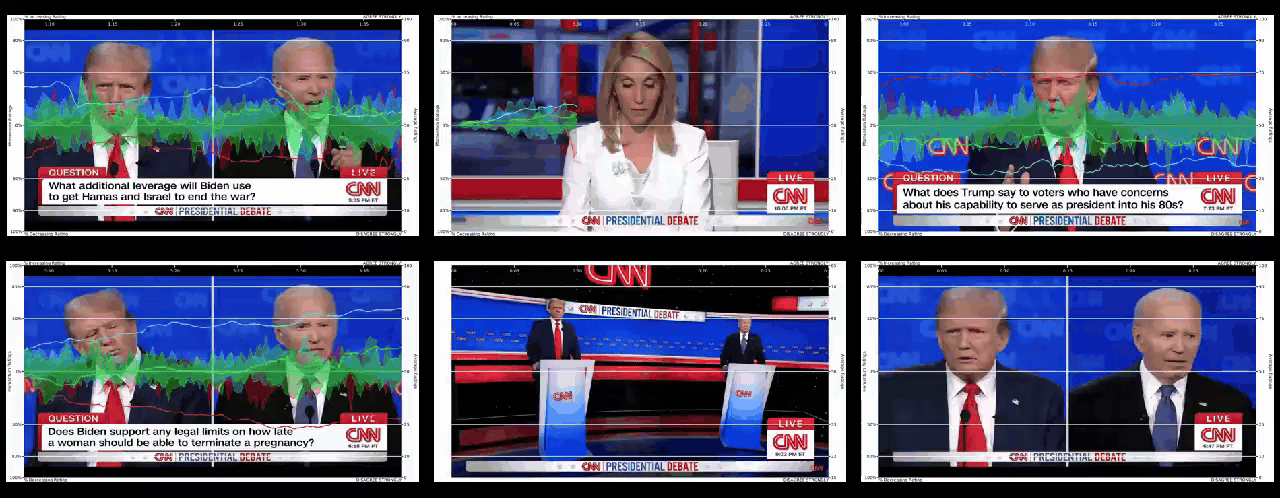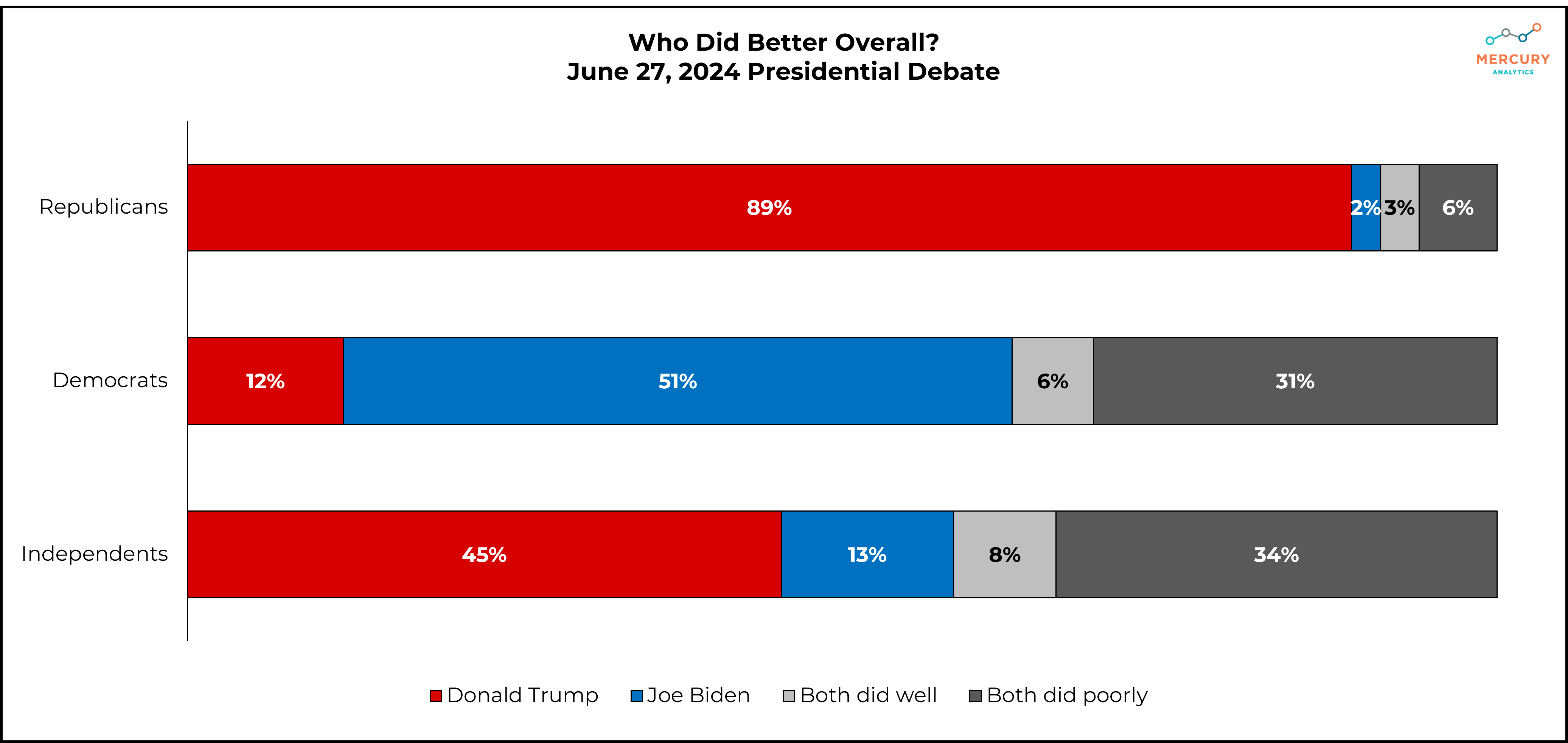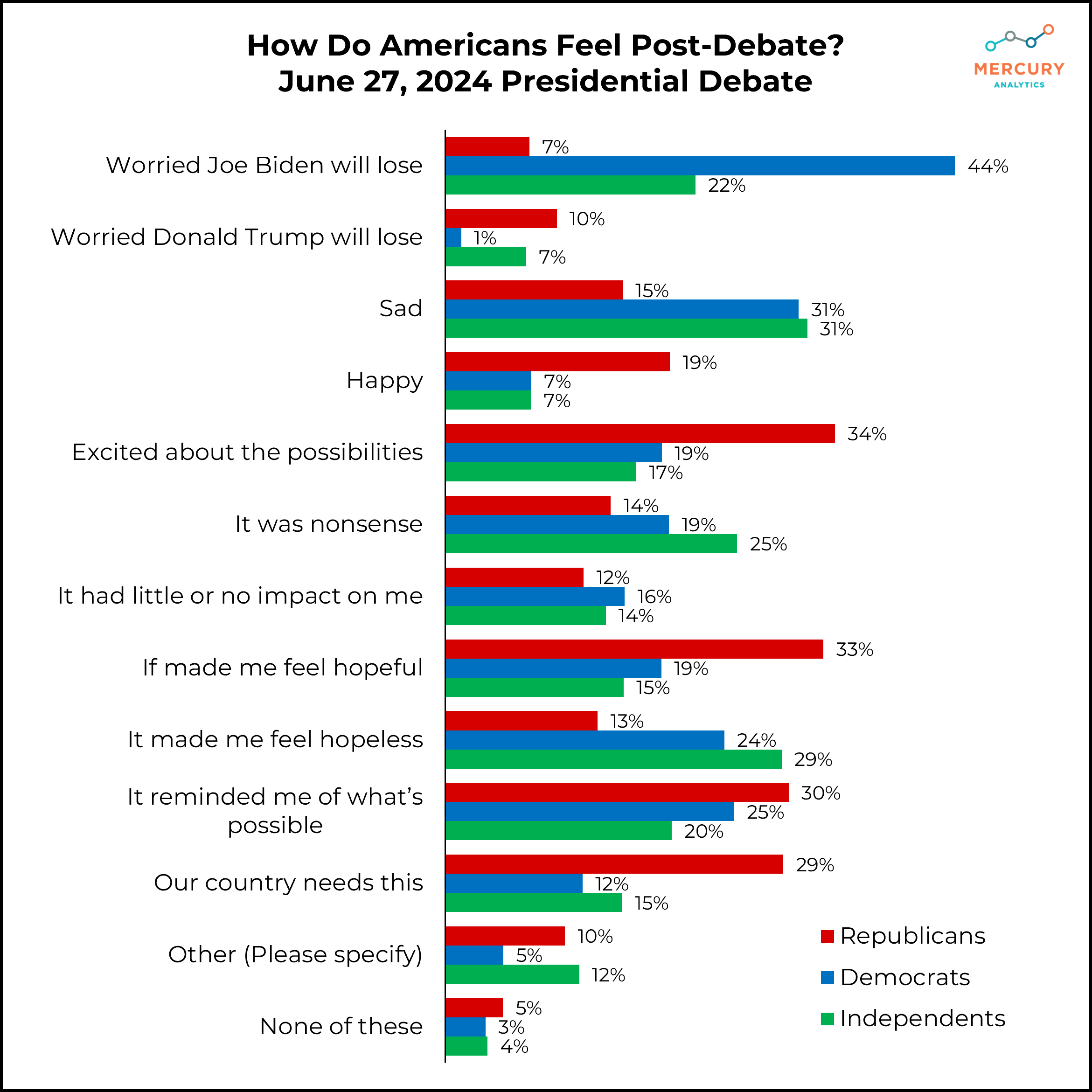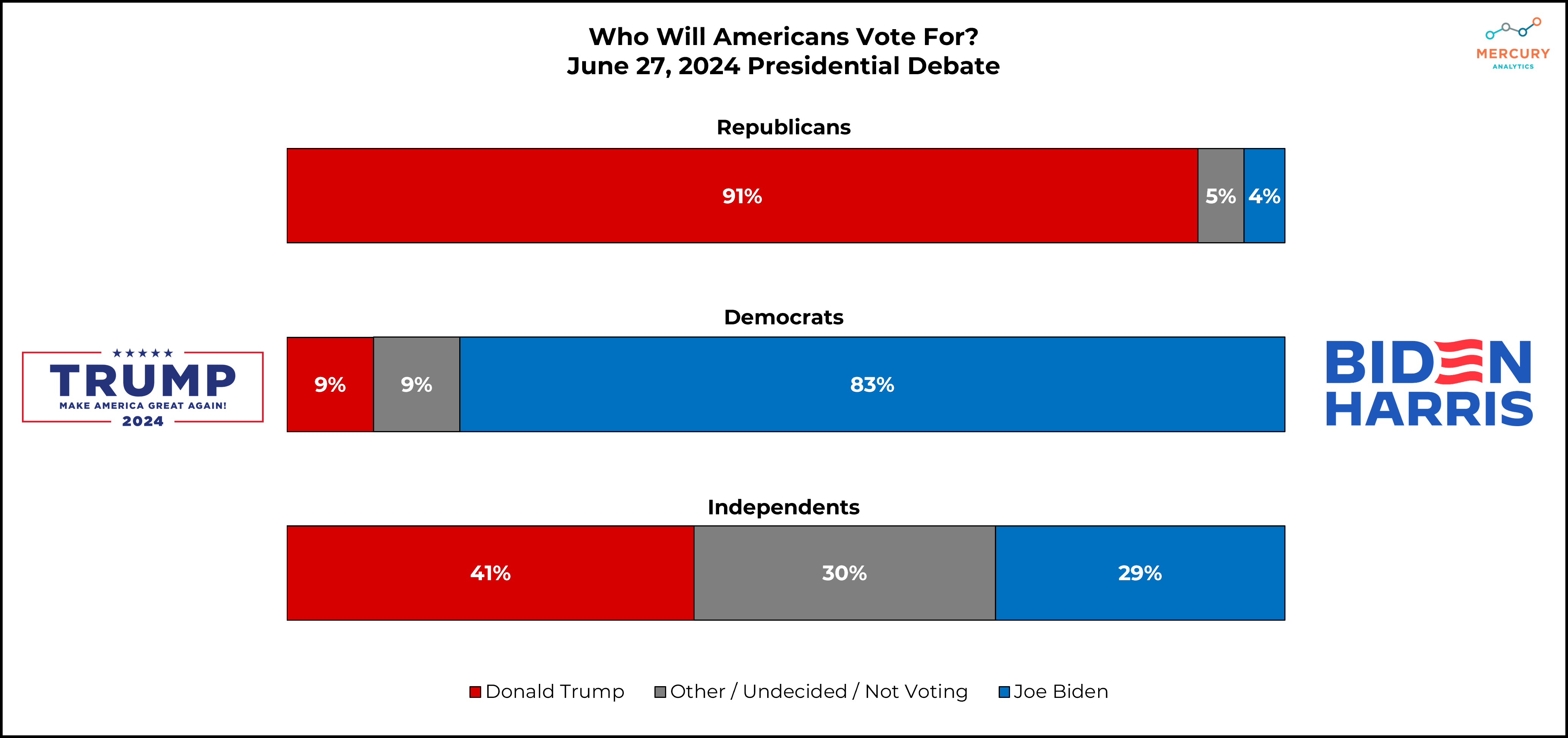2024 First Presidential Debate
Overnight National Research Among 2404 Likely Voters
On June 27th, 2024, the first presidential debate took place at CNN’s Atlanta Studios.

THE SETTING
Mercury Analytics conducted an overnight survey including dial-tests of the presidential debate between President Joe Biden and former President Donald Trump, which took place on June 27th, 2024 at CNN’s Atlanta studios.
This debate format departs from previous debates in many ways. The candidates forwent opening statements and went straight into questions, with 2 minutes allotted for responses and 1 minute for rebuttals. At the end, the candidates were given 2 minutes for brief closing statements. Additionally, in contrast to prior debates, last night’s debate was not filmed in front of a live audience and featured two commercial breaks (during which candidates were not allowed to interact with their staff).
Both candidates agreed to mute their microphones unless they were directed to speak and were not allowed to bring prewritten notes or props, though they were given a water bottle, pen, and paper. Biden chose the podium to the viewer’s right and Trump gave the final closing statement.
The debate started at 9:00 p.m. EST and consisted of 14 segments dedicated to various topics affecting the US. Jake Tapper and Dana Bash of CNN moderated the presidential debate, and selected the following topics: the economy, women’s rights, immigration, the Middle East, the state of democracy, MAGA, persistent challenges facing the US, the climate crisis, social security, cost of childcare, the opioid crisis, and individual concerns about each candidate.
Mercury’s study tested the candidates’ performance among a national sample of n=2404 likely voters. Respondents were first asked a series of demographic questions followed by questions to help understand respondents’ current views on politics in America, and specifically regarding President Joe Biden and former President Trump. Respondents who had watched the debate live (n975) were directed to a quick poll gauging their reactions to the debate, while those who had not watched the debate live (n1429) participated in a dial test exercise in which they were shown a short clip from the debate and asked to provide moment-to-moment reactions.
As participants watched the video, they moved a slider just below the video to the right the more strongly they agreed with what they were seeing and hearing, or to the left the more strongly they disagreed with the candidate. They also had the option to push a button that would identify a “GREAT MOMENT” or a moment when they felt “THAT’S NOT TRUE”.
Before the close of the survey, respondents were asked post-exposure questions to assess their reactions to both candidates’ performance in the debate.
For more information on Mercury’s dial-testing, click here, and for more technical information about the study, please contact Jordan Kraft or at 202-386-6322 x 322.
FULL DEBATE SUMMARY ANALYSIS
Fielded Among n975 Likely Voters Who Watched the Debate Live
POWERED BY MERCURYAI
The landscape of political perceptions, behaviors, and preferences was brought into focus through a comprehensive online research study performed by Mercury Analytics, targeting individuals who watched the presidential debate on June 27th, 2024. The study aimed to unearth insights regarding voting behaviors, political inclinations, and demographic information, while also critically evaluating likely voters’ perceptions of the debate performances of President Joe Biden and former President Donald Trump. The survey sample consisted of 975 respondents, with a margin of error of +-2.19%, allowing for a highly reliable representation of public opinion.
Key Findings and Critical Insights:
- Political Affiliations: The survey’s initial question revealed a balanced political composition among the respondents. The audience was split across varying degrees of political affiliation: 22% identified as “Strong Republicans”, 16% as “Lean More Republican”, 21% as “Independents”, 16% as “Lean More Democrat”, 24% as “Strong Democrats”, and 1% specified other affiliations. This diverse mix provided a holistic view of the audience’s political spectrum.
- Perceived Debate Performance: The most crucial insight came from assessing which candidate survey respondents thought performed best in the debate. Nearly half (49%) believed that Donald Trump performed better, compared to 24% who favored Joe Biden. Interestingly, 21% of respondents felt that both candidates performed poorly, indicating a notable level of dissatisfaction toward the debate’s overall quality.
- Evaluation of Candidate Performances: When dissecting the performances of Joe Biden and Donald Trump based on specific characteristics, distinct differences emerged. Joe Biden was viewed positively in several areas: 40% felt he presented his vision and beliefs effectively, and 33% found him respectful. However, 18% deemed him discourteous, and 12% thought he was overly aggressive.
- In contrast, Donald Trump was rated highly for confidence (50%) and his ability to present his vision and beliefs (43%). Conversely, 32% perceived him as overly aggressive, and 29% found him discourteous. This duality highlights a polarized perception of Trump’s assertive debating style.
- Appeal to Undecided Voters: The question of whether the candidates’ debate performances increased their appeal to undecided voters or supporters of the opposing candidate rendered notable insights. Only 23% believed that Joe Biden had enhanced his appeal to undecided or Trump-supporting voters, while a substantial 50% thought he had not. Conversely, 37% felt that Donald Trump had increased his appeal, with only 31% believing he had not.
- Emotional Impact of the Debate: Likely Voters’ emotional responses after watching the debate were mixed. While 26% felt reminded of what’s possible, 25% worried that Joe Biden would lose, and 23% felt sad. On a positive note, 24% felt excited about the possibilities, and 22% felt hopeful. Interestingly, 18% deemed the debate as nonsense, reflecting a sense of disillusionment among some viewers.
- Concerns about Candidates: A critical insight emerged from questions around which candidate posed greater concern to respondents. A substantial 61% were more worried about Joe Biden’s age and ability to perform his duties, whereas 39% were concerned about Donald Trump’s temperament and legal problems. This indicates that despite performance perceptions, Biden’s age remains a considerable worry for many.
- Policy Concerns: When asked about policy concerns, 55% were more apprehensive about Joe Biden setting economic policy compared to 45% who were worried about Donald Trump’s stance on abortion rights. This highlights that economic policy remains a pressing issue for a majority of likely voters.
- Potential Voting Decisions: The question of voting preferences if the election were held today revealed a lead for Donald Trump, with 47% of respondents indicating a likelihood to vote for him (Top-3-Box), against 40% for Joe Biden (Bottom-3-Box). It’s noteworthy that 7% remained unsure, reflecting a segment of undecided voters still in play.
Summary:
This study provided a rich tapestry of insights into the political landscape and perceptions of the audience who watched the recent presidential debate. The findings indicated a distinct polarization in political affiliations with a nearly even split between Republican and Democrat leanings.
Notably, Donald Trump was perceived to have performed better in the debate, although a significant portion of respondents felt both candidates did poorly. Performance evaluations further illustrated stark contrasts in candidate perceptions, particularly regarding qualities like aggression, confidence, and respectfulness.
A critical takeaway is the limited impact of the debate on swaying undecided voters or those leaning towards the opposition. Emotional responses to the debate were varied, with a notable segment expressing worry and sadness, highlighting the emotional stakes tied to these performances.
The predominant concerns about Joe Biden’s age and ability, paired with worries about Donald Trump’s temperament and policy positions, delineate the key issues impacting voter sentiment. The data suggests a lead for Donald Trump if the election were held today, underscoring the complexity and divided nature of the current political climate.
Overall, this study brings to light the nuanced perceptions and concerns of the electorate, providing a wealth of data that can inform future political strategies and understandings. The results summarize a divided yet engaged voter base, with distinct concerns that could define the upcoming election’s outcome.
MERCURYAI
MercuryAI is an OpenAI-powered research platform designed for rapid, in-depth analysis of quantitative and qualitative data, enabling users to quickly and easily produce a high-level topline summary with just a few clicks, or dive deeper into qualitative information to define key themes and takeaways.
Integrated into the Mercury Analytics Workbench, MercuryAI provides comprehensive insight into quantitative research, open-end verbatims, focus groups, and interviews or IDIs while maintaining data integrity and keeping proprietary information secure.
MercuryAI allows researchers to understand respondents’ reactions to survey questions, quickly decoding thousands of verbatims or breaking down video segments to uncover major themes, emotional underpinnings, and high-level takeaways. Users can also compare and contrast different audiences, highlighting similarities and key differences between demographic segments with just a few clicks.
MercuryAI is available at no additional cost with all Mercury-run projects. Additionally, users may upload their own project data to MercuryAI for a fee.
let's connect today.
better technology. better insights. better decisions.

1120 20TH ST NW. SUITE 350
WASHINGTON, DC 20036
202.386.6322 EXT 2
Reach out
© 2025 Mercury Analytics, All Rights Reserved | Privacy Policy



